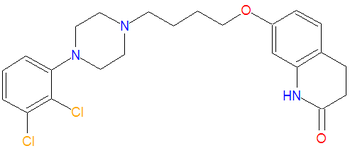Aripiprazole: Difference between revisions
imported>David E. Volk (Chemical structure and chem infobox) |
Pat Palmer (talk | contribs) m (Text replacement - "United States" to "United States of America") |
||
| Line 20: | Line 20: | ||
In [[medicine]], '''aripiprazole''' (pronunciation: ay ri pip' ray zole) is an atypical or second generation [[antipsychotic agent]] that "has both presynaptic [[dopamine]] autoreceptor agonistic activity and postsynaptic D<sub>2</sub> receptor antagonistic activity; structure given in first source; use associated with hyperglycemia."<ref>{{MeSH}}</ref> | In [[medicine]], '''aripiprazole''' (pronunciation: ay ri pip' ray zole) is an atypical or second generation [[antipsychotic agent]] that "has both presynaptic [[dopamine]] autoreceptor agonistic activity and postsynaptic D<sub>2</sub> receptor antagonistic activity; structure given in first source; use associated with hyperglycemia."<ref>{{MeSH}}</ref> | ||
In the [[United States]], the [[Food and Drug Administration]] has approved the use of aripiprazole for the treatment of [[schizophrenia]], [[bipolar disorder|bipolar I disorder]], [[major depressive disorder]], irritability associated with [[autistic disorder]] agitation associated with [[schizophrenia]] or mania from [[bipolar disorder]]. It is also approved as an adjunct to antidepressants.<ref>{{citation | In the [[United States of America]], the [[Food and Drug Administration]] has approved the use of aripiprazole for the treatment of [[schizophrenia]], [[bipolar disorder|bipolar I disorder]], [[major depressive disorder]], irritability associated with [[autistic disorder]] agitation associated with [[schizophrenia]] or mania from [[bipolar disorder]]. It is also approved as an adjunct to antidepressants.<ref>{{citation | ||
| title = Beneficial acute antidepressant effects of aripiprazole as an adjunctive treatment or monotherapy in bipolar patients unresponsive to mood stabilizers: results from a 16-week open-label trial | | title = Beneficial acute antidepressant effects of aripiprazole as an adjunctive treatment or monotherapy in bipolar patients unresponsive to mood stabilizers: results from a 16-week open-label trial | ||
| date = December 2008 | volume = 9 | issue = 18 | pages = 3145-3149 | doi =10.1517/14656560802504490 | | date = December 2008 | volume = 9 | issue = 18 | pages = 3145-3149 | doi =10.1517/14656560802504490 | ||
Revision as of 10:50, 2 February 2023
|
| |||||||
| Aripiprazole | |||||||
| |||||||
| Uses: | antipsychotic agent | ||||||
| Properties: | medication | ||||||
| Hazards: | see side effects & drug interactions | ||||||
| |||||||
In medicine, aripiprazole (pronunciation: ay ri pip' ray zole) is an atypical or second generation antipsychotic agent that "has both presynaptic dopamine autoreceptor agonistic activity and postsynaptic D2 receptor antagonistic activity; structure given in first source; use associated with hyperglycemia."[1]
In the United States of America, the Food and Drug Administration has approved the use of aripiprazole for the treatment of schizophrenia, bipolar I disorder, major depressive disorder, irritability associated with autistic disorder agitation associated with schizophrenia or mania from bipolar disorder. It is also approved as an adjunct to antidepressants.[2] The trade name is Abilify™. Although not approved for the treatment of dementia, aripiprazole has been studied in this setting.
References
- ↑ Anonymous (2024), Aripiprazole (English). Medical Subject Headings. U.S. National Library of Medicine.
- ↑ Marianna Mazza, Maria Rosaria Squillacioti1, Riccardo Daniele Pecora, Luigi Janiri1 & Pietro Bria (December 2008), "Beneficial acute antidepressant effects of aripiprazole as an adjunctive treatment or monotherapy in bipolar patients unresponsive to mood stabilizers: results from a 16-week open-label trial", Expert Opinion on Pharmacotherapy 9 (18): 3145-3149, DOI:10.1517/14656560802504490
